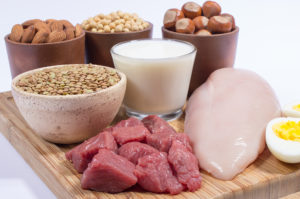Juma Iraki of Iraki Nutrition interviewed me on the topic of protein distribution.
Some of the questions asked:
- What dose of protein optimally stimulates muscle growth?
- Is there any differences in regards to protein quality on muscle growth?
- Does protein timing and distribution matter, or only total protein intake?
See the video here:
Or go download the podcast here.
I’ve written more on this topic in The Ultimate Guide to Muscle Protein Synthesis.
I’m working on more protein distribution related content. Subscribe to the newsletter below to not miss it!


Loved the interview, Jorn. It’s good to see you’re finally getting the recognition you deserve for all of your research.
I’m still interested in soy protein. I’ve read the bio-availability is about 85% compared to whey protein. I spike my own soy protein powder with BCAA’s (especially leucine) to make sure the leucine content is comparable to whey.
If you do these 2 things, do you think you get a comparable MPS effect to whey if you drink about 20% more soy protein shake (to overcome the reduced bio-availability).
What are some other good slow-digesting protein sources for the vegans out there?
Thanks Stijn.
Bioavailability of protein is not the most relevant variable for our interests. The capacity of a protein to stimulate muscle protein synthesis (MPS) is what we really care about. Bioavailability is just one of the factors involved in the effect of a protein on MPS.
Whey protein is about 20-30% more effective than soy at stimulating MPS. But soy is more effective than casein protein, suggesting that soy can outperform at least some types of animal protein (Tang, 2009). However, in a long-term study, milk (80% casein, 20% whey) resulted in greater muscle mass gains than soy protein (Hartman, 2007).
I’m not a fan of BCAA supplementation. There is no evidence that BCAA supplementation is more effective than leucine supplementation on its own. In fact, the only study that looked at this suggests that leucine alone is more effective than BCAA supplementation (Churchward-Venne, 2014). This is described in more detail in section 7.3 ”Leucine” of my Ultimate Guide to Muscle Protein Synthesis article.
I do think that increasing the amount of soy protein you drink and adding leucine can result in a comparable increase in MPS as whey.
Only soy protein and wheat protein are the only plant-based protein sources that have been studied so far. Soy is fast protein. Wheat protein doesn’t give a rapid peak in amino acids as whey does, neither does it keep amino acids elevated for a long time like a slowly digesting protein does.
If you want slow-digesting plant-based protein, I would simply eat plant-based whole food.